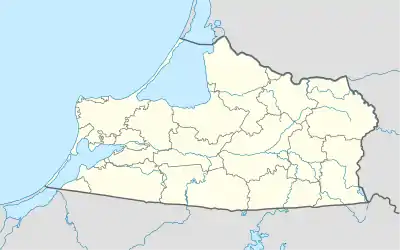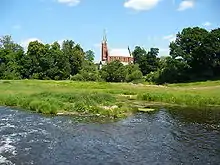Krasnoznamensk, Kaliningrad Oblast
Krasnoznamensk (Russian: Краснозна́менск, lit. Red Banner Town), formerly Lasdehnen (1734-1938; Lithuanian: Lazdynai) and Haselberg (1938-1946), is a town and the administrative center of Krasnoznamensky District in Kaliningrad Oblast, Russia, located on the Sheshupe River, 163 kilometers (101 mi) northeast of Kaliningrad, the administrative center of the oblast, and approximately 10 kilometers (6.2 mi) to the south of the border with Lithuania. It has a population of 3,522 (2010 Census).[3]
Krasnoznamensk
Краснознаменск | |
|---|---|
Town[1] | |
 Krasnoznamensky District Administration building in Krasnoznamensk | |
.png.webp) Flag .png.webp) Coat of arms | |
Location of Krasnoznamensk 
| |
 Krasnoznamensk Location of Krasnoznamensk  Krasnoznamensk Krasnoznamensk (Kaliningrad Oblast) | |
| Coordinates: 54°56′32″N 22°29′23″E | |
| Country | Russia |
| Federal subject | Kaliningrad Oblast[1] |
| Administrative district | Krasnoznamensky District[1] |
| Town of district significance | Krasnoznamensk[1] |
| Founded | 1734[2] |
| Elevation | 30 m (100 ft) |
| Population | |
| • Total | 3,522 |
| • Estimate (2018)[4] | 3,188 (−9.5%) |
| • Capital of | Krasnoznamensky District[5], town of district significance of Krasnoznamensk[5] |
| • Urban okrug | Krasnoznamensky Urban Okrug[6] |
| • Capital of | Krasnoznamensky Urban Okrug[6] |
| Time zone | UTC+2 (MSK–1 |
| Postal code(s)[8] | 238730 |
| OKTMO ID | 27713000001 |
Historically known as Lasdehnen, the town belonged to Prussia since 1701 and the German Empire since the unification of Germany in 1871, and was located in the province of East Prussia until 1945. During the Nazi Germany era it was renamed Haselberg until the territory was annexed by the Soviet Union following World War II. The town was renamed Krasnoznamensk and became the administrative center of Krasnoznamensky District in 1947.
History
The earliest surviving German language record of Krasnoznamensk dates from 1521 under the name Haselpusch, meaning hazel bush in German, while Russian sources give the date of the earliest record as 1576 and other sources state that it was established in 1734.[2] The village had a church by 1578, but it burned down in 1661 and the replacement building had to be taken down in 1869 due to severe structural defects. In the early 18th century the town's name was changed to Lasdehnen, based on the Old Prussian language term for hazel bushes, and the current Gothic Revival church was built between 1874 and 1877. With nationalism still on the rise across most of Europe in the early 20th century, in 1938 the Nazi era government Germanized the town's name, renaming it to Haselberg (literally "hazel mountain") due to the Baltic origins of Lasdehnen.

By 1945, during World War II, Haselberg's ethnic German population had largely fled before the advance of the Red Army in 18 January. Following the end of the war Haselberg was included in the portion of East Prussia annexed by the Soviet Union that was organized into Kaliningrad Oblast of the Russian SFSR. The historical regional capital of nearby Schloßberg (still commonly known by its pre-1938 name Pillkallen, now Dobrovolsk) had been severely damaged during the course the war, so Soviet authorities relocated Pillkallen's former administrative functions to Haselberg, which had suffered less damage. On 7 April 1946, the Soviets renamed the town as Krasnoznamensk, literally "Red Banner Town", and the following year became the administrative center of the new Krasnoznamensky District.[2]
Administrative and municipal status
Within the framework of administrative divisions, Krasnoznamensk serves as the administrative center of Krasnoznamensky District.[5] As an administrative division, it is, together with two rural localities, incorporated within Krasnoznamensky District as the town of district significance of Krasnoznamensk.[5]
Within the framework of municipal divisions, since May 5, 2015, the territories of the town of district significance of Krasnoznamensk and of three rural okrugs of Krasnoznamensky District are incorporated as Krasnoznamensky Urban Okrug.[6] Before that, the town of district significance was incorporated within Krasnoznamensky Municipal District as Krasnoznamenskoye Urban Settlement.[6]
Demographics
Population trends
- 1,294 (1885 Census)[9]
- 1,857 (1910 Census)[10]
- 2,065 (1933 Census)[11]
- 2,070 (1939 Census)[12]
- 2,843 (1959 Census)
- 2,911 (1970 Census)
- 3,392 (1979 Census)[13]
- 3,894 (1989 Census)[14]
- 3,751 (2002 Census)[15]
- 3,522 (2010 Census)[3]
Ethnic composition
According to the 2010 census: Russians - 87.4%, Lithuanians - 2.8%, Ukrainians - 2.5%, Belarusians - 2.5%, Roma - 1%, Armenians - 1%, Germans - 0.9%, Tatars - 0.6%, Poles - 0.5%, others - 0.8%
Krasnoznamensk is in the ethnographic region known as Lithuania Minor, and Lithuanian cultural organizations exist in the town.[16]
Where religion is recorded from the census process, pre-1945 census data show the religious affiliation of the population as Prussian Evangelical.
External links
- Mojgorod.ru. Entry on Krasnoznamensk (in Russian)
References
Notes
- Law #463
- Энциклопедия Города России. Moscow: Большая Российская Энциклопедия. 2003. p. 219. ISBN 5-7107-7399-9.
- Russian Federal State Statistics Service (2011). "Всероссийская перепись населения 2010 года. Том 1" [2010 All-Russian Population Census, vol. 1]. Всероссийская перепись населения 2010 года [2010 All-Russia Population Census] (in Russian). Federal State Statistics Service.
- "26. Численность постоянного населения Российской Федерации по муниципальным образованиям на 1 января 2018 года". Federal State Statistics Service. Retrieved January 23, 2019.
- Resolution #640
- Law #419
- "Об исчислении времени". Официальный интернет-портал правовой информации (in Russian). June 3, 2011. Retrieved January 19, 2019.
- Почта России. Информационно-вычислительный центр ОАСУ РПО. (Russian Post). Поиск объектов почтовой связи (Postal Objects Search) (in Russian)
- http://www.geschichte-on-demand.de/pillkallen.html 1885 census data: note that the town then was identified as "Haselberg (früher Lasdehnen)" (Haselberg (formerly Lasdehnen))
- http://www.gemeindeverzeichnis.de/gem1900//gem1900.htm?ostpreussen/pillkallen.htm 1910 census data: note that the town then was called Lasdehnen
- http://www.geschichte-on-demand.de/pillkallen.html 1885 census data: note that the town then was identified as "Haselberg (früher Lasdehnen)" (Haselberg (formerly Lasdehnen))
- http://www.geschichte-on-demand.de/pillkallen.html 1885 census data: note that the town then was identified as "Haselberg (früher Lasdehnen)" (Haselberg (formerly Lasdehnen))
- "Всесоюзная перепись населения 1979 г. Национальный состав населения по регионам России" [All Union Population Census of 1979. Ethnic composition of the population by regions of Russia.]. Demoscope Weekly (website of the Institute of Demographics of the State University—Higher School of Economics) (in Russian). 1979. Retrieved November 25, 2008.
- "Всесоюзная перепись населения 1989 г. Численность наличного населения союзных и автономных республик, автономных областей и округов, краёв, областей, районов, городских поселений и сёл-райцентров" [All Union Population Census of 1989: Present Population of Union and Autonomous Republics, Autonomous Oblasts and Okrugs, Krais, Oblasts, Districts, Urban Settlements, and Villages Serving as District Administrative Centers]. Всесоюзная перепись населения 1989 года [All-Union Population Census of 1989] (in Russian). Институт демографии Национального исследовательского университета: Высшая школа экономики [Institute of Demography at the National Research University: Higher School of Economics]. 1989 – via Demoscope Weekly.
- Russian Federal State Statistics Service (May 21, 2004). "Численность населения России, субъектов Российской Федерации в составе федеральных округов, районов, городских поселений, сельских населённых пунктов – районных центров и сельских населённых пунктов с населением 3 тысячи и более человек" [Population of Russia, Its Federal Districts, Federal Subjects, Districts, Urban Localities, Rural Localities—Administrative Centers, and Rural Localities with Population of Over 3,000] (XLS). Всероссийская перепись населения 2002 года [All-Russia Population Census of 2002] (in Russian).
Sources
- Калининградская областная Дума. Закон №463 от 27 мая 2010 г. «Об административно-территориальном устройстве Калининградской области», в ред. Закона №450 от 3 июля 2015 г. «О внесении изменений в Закон Калининградской области "Об административно-территориальном устройстве Калининградской области"». Вступил в силу со дня официального опубликования. Опубликован: "Калининградская правда" (вкладыш "Ведомости Правительства Калининградской области"), №112, 26 июня 2010 г. (Kaliningrad Oblast Duma. Law #463 of May 27, 2010 On the Administrative-Territorial Structure of Kaliningrad Oblast, as amended by the Law #450 of July 3, 2015 On Amending the Law of Kaliningrad Oblast "On the Administrative-Territorial Structure of Kaliningrad Oblast". Effective as of the day of the official publication.).
- Правительство Калининградской области. Постановление №640 от 30 августа 2011 г. «Об утверждении реестра объектов административно-территориального деления Калининградской области», в ред. Постановления №877 от 21 ноября 2011 г «О внесении изменения в Постановление Правительства Калининградской области от 30 августа 2011 г. №640». Вступил в силу со дня официального опубликования. Опубликован: "Калининградская правда" (вкладыш "Официально"), №170, 15 сентября 2011 г. (Government of Kaliningrad Oblast. Resolution #640 of August 30, 2011 On the Adoption of the Registry of the Objects of the Administrative-Territorial Divisions of Kaliningrad Oblast, as amended by the Resolution #877 of November 21, 2011 On Amending the Resolution of the Government of Kaliningrad Oblast #640 of August 30, 2011. Effective as of the day of the official publication.).
- Калининградская областная Дума. Закон №419 от 27 апреля 2015 г. «Об объединении поселений, входящих в состав муниципального образования "Краснознаменский муниципальный район" и организации местного самоуправления на объединённой территории». Вступил в силу со дня официального опубликования. Опубликован: Официальный интернет-портал правовой информации http://www.pravo.gov.ru, 5 мая 2015 г. (Kaliningrad Oblast Duma. Law #419 of April 27, 2015 On the Merger of the Settlements Comprising the Municipal Formation of "Krasnoznamensky Municipal District" and on the Organization of the Local-Self Government on the United Territory. Effective as of the day of the official publication.).